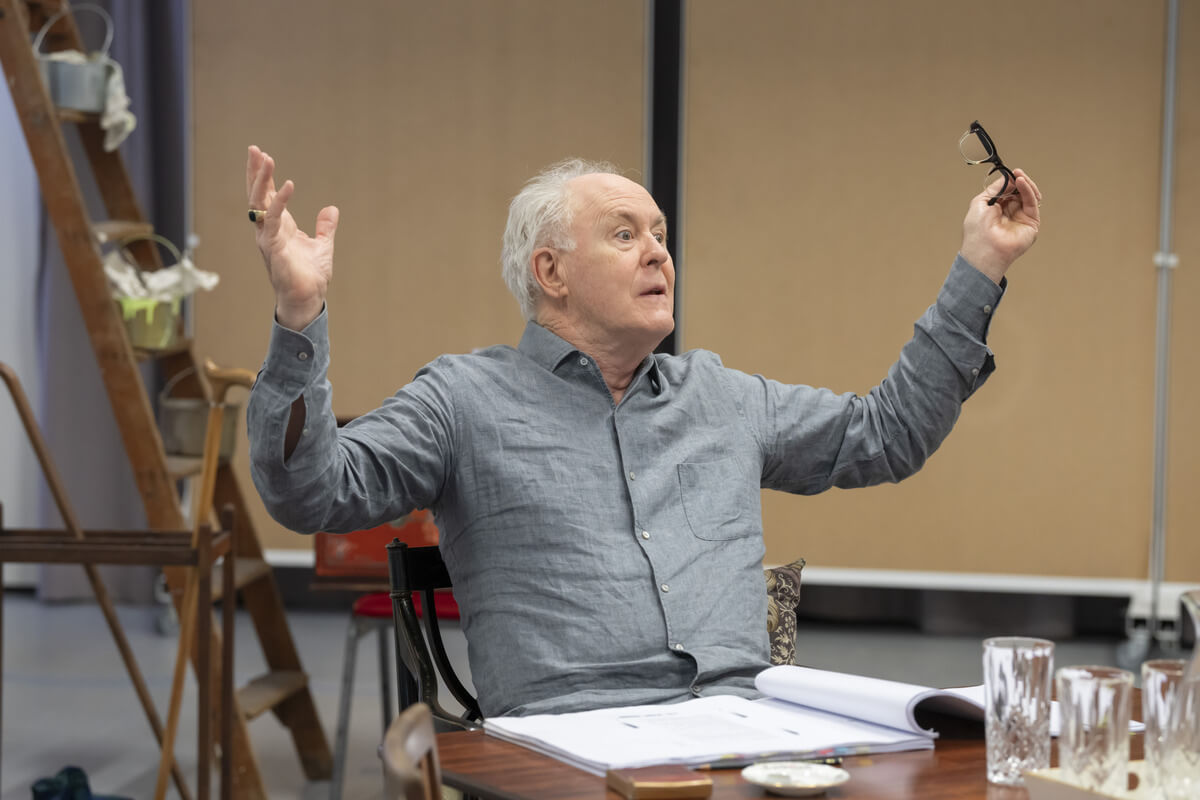Their limited engagement double bill at the Theatre Royal Haymarket includes Uncle Vanya, but they opened on Tuesday with a stage adaptation of Vasily Grossman’s celebrated novel, LIFE AND FATE which was banned in the USSR due to the uncomfortable parallels it drew between Communism - as practised in the Soviet Union - and the fevered, nationalistic Naziism prevalent in Germany during the war. Under the orders of both Stalin and later, Krushchev, it remained unpublished during Grossman’s lifetime (he died of stomach cancer in 1964) but a small chain of dissidents which included Andrei Sakharov smuggled a copy to the west where it was eventually published. By 1988 it was also to be found on bookshelves in Russia.
This production began touring the world in 2007 and has finally surfaced in London for the first time. The uncomfortable question (or should that be elephant in the stalls?) is: Why has it taken so long for a producer to give it space in arguably the preeminent theatre capital of the world? And, (given the highly competitive nature of commercial theatre in the London), what audience could it possibly hope to find during its brief stay at the Haymarket? In essence the second question answers the first.
The sweeping tale which is told by actors in Russian (with more than a smattering of translation errors in the English surtitles) follows the lives and fortunes of a Jewish family - Victor and Lyudmila Shtrum, and their immediate descendants and antecedents. He is a nuclear physicist who in academic circles deals with the pure logic of mathematics and has consequently found himself out-of-step with Stalin and the party apparatus. His mother writes poignant letters from the ghetto as the Germans tighten their grip and impose steadily more punitive controls. His wife frets about her son who is in the army, her former husband who has been sent to a gulag as a result of one of the purges, and her sister who is conducting a dangerous affair.
As a renowned war correspondent, Grossman covered several major battles including Moscow, Stalingrad and Berlin as well as ethnic cleansing of Poles and Ukrainians and the liberation of Treblinka. It is unsurprising therefore that his characters often deliver long, extensive passages bursting with descriptive journalistic prose. Many speak of small human kindnesses juxtaposed against the horrific backdrop of war. It’s all terribly worthy and informative and delivered by a Russian troupe bursting with undoubted talent. Ultimately however, this reviewer longed to read the original text rather than endure the seemingly endless bleak delivery of progressively worsening hardships. It felt like the theatrical equivalent of gulag community service or religious penance. Even the set - most notable for a volleyball net which morphs into a face-height, prison camp wire fence, felt 25 years behind the times and in need of dynamic reconsideration by the creative team.
The company notably rehearses texts for years before bringing them to an audience which enables cast and director to delve deeply and ‘get to the marrow’ of a piece. But I wondered if they had become so engrossed in the subject matter that they had in part forgotten one of the essential elements in presenting such work: namely be informative and thought-provoking of course, but above all, entertain your audience.
Grossman’s undoubted talent in providing graphic accounts of war atrocities helped support convictions at Nuremberg and provided much of the backbone record of what now constitutes The Holocaust.
However, a play cannot hope to encompass the entirety of his life’s work) and overreaches by attempting to cover too much. It is certainly sweeping and feels terribly long. More specific pieces such as “Ghetto”, “Professor Mamlock”, “Himmelweg” and “Bent” have dealt with elements more successfully. If you are eager to spend a warm summer evening plumbing the depths of such horrors, then I commend “Life and Fate” to you... Besides, at the interval you can always entertain yourself by observing the plethora of young (and not-so-young) female Russian audience members, fresh from their Knightsbridge shopping excursions and visits to the plastic surgeons where the trend is clearly to be made to look not only younger, but more feline.

 Some theatre companies are cloaked in such international prestige, that announcements of their intention to perform a limited season in a major city will drive a surge in box office receipts. So it is, with St Petersburg’s Maly Drama Theatre.
Some theatre companies are cloaked in such international prestige, that announcements of their intention to perform a limited season in a major city will drive a surge in box office receipts. So it is, with St Petersburg’s Maly Drama Theatre.



 NoF*cksGiven is the debut play from playwright Daisy King. As part of The King’s Head ‘Who Run The World’ season of work by female playwrights, NoF*cksGiven is an insight into the world of homelessness through the eyes of a 20 something party girl.
NoF*cksGiven is the debut play from playwright Daisy King. As part of The King’s Head ‘Who Run The World’ season of work by female playwrights, NoF*cksGiven is an insight into the world of homelessness through the eyes of a 20 something party girl.